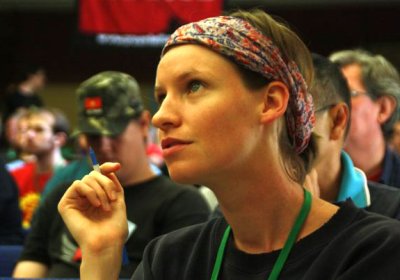Venezuelan trade unionist and community educator Alexis Adarfio Marin visited Australia last month, informing many audiences of the radical changes being carried out by Venezuela’s Bolivarian revolution.
Adarfio was a guest of the Search Foundation, which hosted a range of international guest speakers at its Australian Left Renewal Conference in Sydney over May 29-30.
Socialism
One sentence in the final declaration of the Search Foundation’s Left Renewal Conference (From Global Crisis to Green Future) captured the key issue: “Capitalism has been unable to address inequality, war and ecological degradation, and must be replaced by a democratic system that puts human need before greed, and socialises wealth instead of debt.”
The Idea of Communism
By Tariq Ali
Seagull Press 2009, 126 pages
This short book is the first in a series called “What Was Communism”, which aims to explore the practice of Communism in the 20th century.
Tariq Ali’s main thesis is that “The failure of official Communism in the 20th century and the restoration of capitalism in Russia and China … far from negating some of the premises that underlined the project in the first place, emphasises their continuing importance”.
This must be a momentous occasion. According to the May 22 Sydney Morning Herald, the Dalai Lama — a major leader of a major religion — has declared himself “half Marxist half Buddhist”.
First we must ask questions about Buddhism itself. Is Buddhism a single religion, or even a religion? Would the two main streams constitute a schism? The Dalai Lama is the largely undisputed global figurehead of Mahayana Buddhism. There is no equivalent figurehead in the other dominant stream, Theravada, which stretches from South Asia to South-East Asia.
“Facing the world economic crisis: From Greece to Australia” was the title of a public forum, sponsored by Socialist Alliance, Resistance and Green Left Weekly on May 25.
Marxist academic Gary MacLennan and Socialist Alliance candidate for the federal seat of Brisbane Ewan Saunders spoke.
MacLennan explained that the world economic crisis showed signs of deepening, not ending. He said right-wing explanations of the crisis blamed government mismanagement, rather than the capitalist system.
This Time is Different: Eight Centuries of Financial Folly
By Carmen Reinhart & KennethRogoff
Rrinceton University Press, 2009, 496 pages
Review by Barry Healy
Australia has had a lucky escape from the Global Financial Crisis (GFC) our noble leaders and economic pundits tell us.
Not so, says 800 years of economic experience assembled in This Time Is Different: Eight Centuries of Financial Folly.
To guarantee access to essential foods amid price inflation and supply shortages in some items, the Venezuelan government recently nationalised a major flour producer, granted low-interest credits to small and medium-sized producers, opened new subsidised food markets, sanctioned price speculators and hoarders, and is in the process of reforming its land reform law.
Ten activists from Thai Red Australia, plus Guatemalan and El Salvadoran activists from the Latin American Social Forum, were part of the 80-strong Socialist Alliance NSW state conference on May 22 in Sydney.
The conference launched Socialist Alliance’s federal election campaign. In the opening session, Senate candidate Rachel Evans outlined a “people’s budget” that puts the environment and people’s wellbeing over militarism and profiteering.
Youth activist and part-time worker Gemma Weedall has been endorsed by the Socialist Alliance to contest the seat of Adelaide in the upcoming federal election.
Weedall recently completed a Bachelor of Social Sciences at the University of Adelaide, where she was a well-known student activist.
She was environment officer on the 2009 Student Representative Council and convened several clubs and collectives. A passionate grassroots climate change activist, Gemma is an active member of the Climate Emergency Action Network (CLEAN)
In recent weeks, local and international media have attacked the left-wing Venezuelan government over alleged “economic woes”.
Pointing to Venezuela’s inflation rate — the highest in Latin America — and an economy that shrank 3.3% last year, the private opposition media is raising fears of a serious economic crisis.
These same media outlets, which have been predicting the fall of President Hugo Chavez for years, argue recent government actions will worsen the situation.
Venezuelan business federation Fedecamaras warned on May 5 that Venezuela faces an “economic and social crisis”.
Sergio Arriasis is the head of the office of strategic development for Vision Venezuela Television (ViVe), a government-funded channel inaugurated in 2003. Arriasis is in charge of future planning and development of its communications. Coral Wynter, a Green Left Weekly journalist based in Caracas, spoke with Arriasis about the struggle to counter the private corporate media in Venezuela, and create a radical alternative.
How is ViVe different from other TV channels?
Jess Moore, well-known community activist and part-time worker, will contest the seat of Cunningham on New South Wales’ south coast in the coming federal elections.
Moore, a member of Socialist Alliance, is a leading climate and renewable energy campaigner in Wollongong. She is active in the struggle for marriage equality and helped found the Illawarra Aboriginal Rights Group, set up in response to the racist Northern Territory intervention.
- Previous page
- Page 108
- Next page









